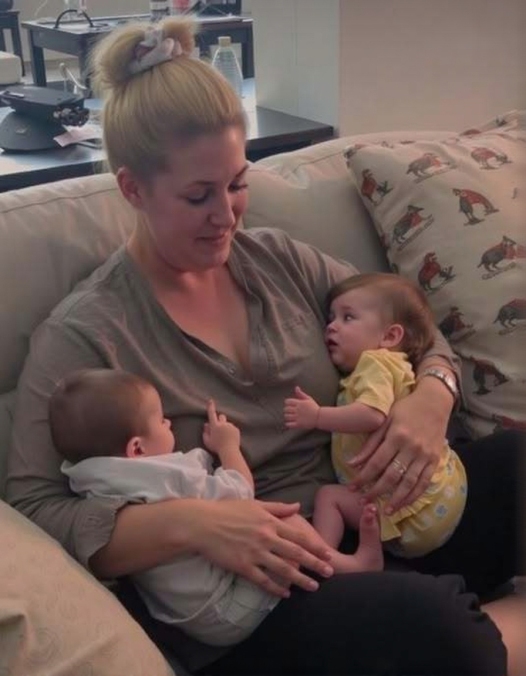My husband promised he’d handle everything if I gave him a baby. He said I wouldn’t have to sacrifice my career. Then the twins arrived, and suddenly, I was “unrealistic” for wanting to keep the job that kept us afloat. He demanded I quit—and I agreed… but on one condition.
My name’s Ava, and I’m a family doctor.
I spent ten years building this life—endless nights in medical school, brutal residency shifts, and learning to hold a stranger’s hand while delivering news no one wants to hear. I’ve stitched up bar fights at 3 a.m., guided terrified parents through their baby’s first fever, and sat with dying patients who just needed someone to listen. It wasn’t easy—but it was everything to me.
Nick, my husband, had a different dream. He wanted a son, more than anything.
“Picture it, Ava,” he’d say, eyes shining. “Teaching him to throw a curveball, rebuilding an old Chevy together on weekends. That’s life.”
I wanted kids too—but I also wanted to keep the life I’d fought so hard to build. My schedule as a family doctor was brutal, juggling 12-hour shifts and emergencies that didn’t care about dinner plans. My patients needed me. Our mortgage needed me. I earned nearly double what Nick did in his sales job. Not out of pride—just fact.
When I finally got pregnant, excitement and fear collided. The ultrasound revealed two heartbeats. “Twins?” Nick cheered, glowing. “Double the dream. Perfect.”
I should have been thrilled. Instead, anxiety fluttered in my chest.
“Nick, you know I can’t just stop working,” I said.
“I’ve got this,” he assured me, squeezing my hand. “Diapers, midnight feedings, all of it. You’ve worked too hard to give up your career now.”
He said it everywhere—at the grocery store, at my baby shower, in the clinic waiting room. People praised him, called him a “good one.” I believed him.
Liam and Noah were born one March morning, six pounds each, all scrunched faces and tiny fists. The first month was chaotic but beautiful. Nick posted photos online, glowing as a dad. I thought we had it all figured out.
A month later, I returned to work—just two shifts a week to keep my license active.
“I’ve got this,” Nick said again, confidently. “The nanny’s handling mornings, I’ll be home by three.”
I wanted to believe him.
I came home after my first 12-hour shift to chaos: wailing babies, bottles in the sink, laundry overflowing, burp cloths everywhere. And Nick? Sitting on the couch scrolling his phone.
“Oh thank God,” he said. “They’ve been crying for two hours. I think they’re broken.”
Something hot and sharp shot through me.
“Did you feed them?”
“I tried. They didn’t want bottles.”
“Did you change them?”
“Probably? I don’t know, Ava. They just want you.”
I stood there, exhausted, in scrubs. By midnight, both babies finally slept. My arms ached. Nick snored.
That became our normal. I worked full shifts, came home exhausted, and did everything while Nick complained.
One night, nursing Liam and typing notes, Noah asleep beside me, I was awake 19 hours. Nick walked by rubbing his temples.
“You know what would fix this?” he asked.
“What?”
“If you stayed home. This is too much. I was wrong about your career.”
I laughed—because screaming would have been inappropriate.
“That’s not happening. You promised I wouldn’t have to quit.”
“Come on, Ava. Stop being unrealistic. Every mom stays home at first. Your career? Over now. I’ll work. You stay home.”
I stared. “So all those promises… about handling everything? About me keeping my career?”
He shrugged. “Things change. You’re a mom now.”
“I was a doctor first.”
“Well, you can’t be both. Not really.”
Something inside me went cold.
“Fine,” I said.
The next morning, I made coffee, set the twins in their bouncers, and took a deep breath.
“Okay. I’ll consider quitting,” I told him.
“Really?” His eyes lit up.
“On one condition,” I said, arms folded. “If I quit, you’ll earn what I do—enough for everything: mortgage, utilities, groceries, insurance, childcare.”
Color drained from his face. He knew. He always knew.
Nick argued. I explained: “You can’t demand I give up my career when you can’t replace what I contribute. That’s just math.”
He left for work, jaw clenched. I stayed, listening to the soft coos of our babies.
For a week, Nick barely spoke. Then, at 2 a.m. on Thursday, Liam cried. I was about to rise when Nick moved—sat up, picked him up, hummed an off-key lullaby. Noah joined in with his cries. Nick smiled. “Guess we’re both up, huh, buddy?”
Next morning, he made breakfast—eggs overcooked, coffee strong—but he made the effort.
“You were right,” he said quietly.
“About what?”
“About everything. I see what your work means. You keep this family afloat. I don’t want you to quit. I’ll make changes so I can actually be here. A real partner.”
I reached across the table. “That’s all I ever wanted: to be a team.”
He squeezed my hand. “We will be. I promise.”
Nick didn’t become perfect overnight. He still forgot burp cloths sometimes, but when Liam cried at 3 a.m., he was up first.
I learned something: Partnership isn’t keeping score. It’s not whose dreams matter more. It’s both people keeping the things that make them whole.
I didn’t give up being a doctor. Nick didn’t give up being a dad. Our twins saw parents who showed up, emotionally and physically. Women don’t have to choose between career and family. Men can nurture and be present. Love means supporting each other’s dreams.
We didn’t need perfection. We just needed presence. That made all the difference.
